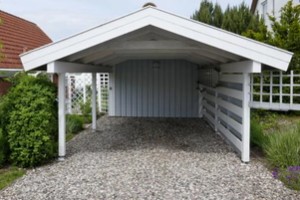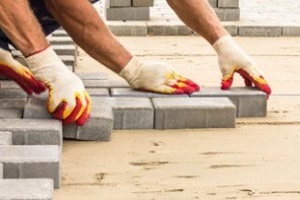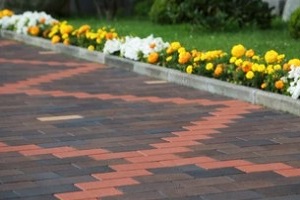If you are installing a driveway at your home or repaving an existing one, it is essential to choose the right material. Here is a closer look at some of the advantages and drawbacks of a few of the most popular driveway materials on the market.
Gravel
 Gravel is a good option for homeowners who are seeking a cost-effective material, and it is particularly popular among those with longer driveways to pave. Although some people may consider using plain rocks to pave a driveway on a lower budget, it is important to keep in mind that gravel compacts far better than plain rocks with repeated use, which leads to a more stable surface.
Gravel is a good option for homeowners who are seeking a cost-effective material, and it is particularly popular among those with longer driveways to pave. Although some people may consider using plain rocks to pave a driveway on a lower budget, it is important to keep in mind that gravel compacts far better than plain rocks with repeated use, which leads to a more stable surface.
Another big point in favor of a gravel driveway is the fact that it is one of the materials that has a lower impact on the environment. Gravel can typically be sourced locally, and its porous surface is amenable to absorbing rainwater. Choosing recycled gravel can minimize the environmental impact of the driveway even further. Some recycling centers may crush old concrete into sizes that may be used to form the base of a driveway.
However, it is important to keep in mind that despite potentially having a lifespan of 100 years, gravel driveways will need to be regraded every couple of years. This depends on how much traffic passes along the driveway. It is also worth noting that these driveways work better in climates that do not see too much snow as gravel driveways are difficult to plow and clear with snow blowers given the propensity for gravel to cling to ice.
Concrete
Concrete is one of the most popular driveway materials thanks to its versatility and durability. It is typically made by combining different types of stone aggregate with water and a lime-based binder. A concrete driveway requires no maintenance, and its surface is not only smooth but also secure and stable.
Another benefit of a concrete driveway is the fact that it manages to remain somewhat cool when it is exposed to direct sunlight, making it particularly suitable to sunny climates. It also moves water easily.
Although plain concrete is not particularly aesthetically pleasing, many people appreciate the fact that concrete is easy to customize simply by painting it or having it stamped.
Many homeowners opt for low-carbon concrete mixes as the cement used in creating concrete is a big contributor to carbon dioxide emissions in addition to admitting volatile organic compounds. It is also worth noting that its impermeable nature means it may send excess rainwater into waterways and sewer systems rather than the ground.
Brick
 Clay brick is often chosen by homeowners for its neat appearance and its ability to stand up well to moderate weather and typical driveway traffic. Bricks can be arranged in the patterns of a homeowner’s choice, and they provide a very smooth surface for cars to drive along.
Clay brick is often chosen by homeowners for its neat appearance and its ability to stand up well to moderate weather and typical driveway traffic. Bricks can be arranged in the patterns of a homeowner’s choice, and they provide a very smooth surface for cars to drive along.
Although their lifespan is around 25 years, brick driveways do need to be pressure washed twice a year, and the bricks need to be resealed to stop the clay from peeling or flaking.
However, environmentally conscious homeowners should consider the fact that bricks are made using mined clay that is heated in an energy-intensive kiln. In addition, bricks that are laid with impervious fillers such as mortar tend to have runoff issues, although gapping it with dirt or sand can help offset this problem.
Seashells
Some homeowners appreciate the unique look provided by a seashell driveway. They are especially popular in coastal areas, although homeowners throughout the country like the beachy look that these driveways provide. They are typically made from a combination of scallops, oysters and clams, and they are very eco-friendly because they are made by recycling waste from the seafood industry.
These can last for several years, although this depends on the look that homeowners are trying to achieve. This is because seashell driveways are initially laid using bigger shell pieces that will break down and compact over time. Therefore, those who prefer the look of bigger shell pieces may need to replenish their driveway more often than those who like the look of the smaller pieces. The driveway may also need to be replenished more often in areas where it will be exposed to heavy winds or lots of rainfall.
Seashells are considered the most environmentally friendly driveway material as they are made using a renewable resource that is a waste product, and they do not contain toxins. Moreover, because they degrade and turn into soil over time, there is no worry about waste.
It is important to keep in mind, however, that seashell driveways can be expensive in areas where the material is not readily available. Homeowners should ensure that the seashells they use for their driveway are harvested legally following best practices.
Paving Stones
 For homeowners who are concerned about curb appeal, it is difficult to top the appealing look of a driveway made of paving stones. These stones are typically made from flagstone or granite, and they require very little maintenance. Moreover, when they are laid properly, they could last for as long as 100 years.
For homeowners who are concerned about curb appeal, it is difficult to top the appealing look of a driveway made of paving stones. These stones are typically made from flagstone or granite, and they require very little maintenance. Moreover, when they are laid properly, they could last for as long as 100 years.
In addition to stopping water from pooling on the driveway, it is possible to install a heating system below the pavers in areas with heavy snowfall to help keep the driveway clear.
When paving stones are sourced locally, they are reasonably eco-friendly as long as they were extracted following proper environmental protections. Using small rocks or sand between the stones instead of a cement filler can improve their permeability and allow rainwater to soak into the ground instead of running off.
Asphalt
Asphalt is a very affordable driveway material that is made using sand, rock and asphalt cement. It has a neat appearance and is very smooth and comfortable to drive and park on. However, there are a few drawbacks, including the need to seal asphalt driveways every couple of years. They also tend to get quite hot in the summer and are considered one of the least environmentally friendly driveways on the market because they are made using petroleum.
Get In Touch With The Driveway Experts
If you are looking to pave or repave a driveway in the Northern Virginia area, contact the professionals at Dirt Connections. We have the tools and expertise needed to tackle all manner of residential driveway paving jobs, from a simple concrete driveway to a beautiful stamped concrete driveway.
Summary

Dirt Connections was started with one goal in mind: providing quality residential and commercial construction services to clients on time and on budget. Reach out for more information on how we can support your next project.
For your convenience our estimates are free and by appointment. Call 703-940-9949 for a free estimate today!









































